
- News
- July 22, 2024
Beryl payouts aid Tobago, Grenada, Saint Vincent, and Trinidad
The Natural Disaster Fund (NDF), managed by Global Parametrics (a CelsiusPro Group company), has provided risk capacity to support the renewal of a multi-peril, multi-layer programme of CCRIF SPC (formerly the Caribbean Catastrophe Risk Insurance Facility).
Hurricane Beryl caused widespread damage across the Caribbean. Within weeks, the NDF released payouts exceeding USD 1.98 million to support businesses and communities in Tobago, Grenada, Saint Vincent, and Trinidad.
The renewal timely secured lines of reinsurance capacity for parametric risk transfer against earthquake, hurricane, excess rainfall, and public utilities catastrophe coverage that Central America and Caribbean governments members of CCRIF SPC purchase for the 2024 annual placement.
The NDF, a public-private partnership funded by UK and German entities, aims to foster climate and NatCat resilience for poor and vulnerable communities, sharing risks with Hannover Re.
The NDF has supported the CCRIF SPC program since 2021, renewing its participation annually. CCRIF SPC is the world’s first regional fund using parametric insurance to provide short-term liquidity to Caribbean and Central American governments when a parametric insurance policy is triggered.
Visit the NDF website.

- News
- July 15, 2024
Swift response to the effects of hurricane Beryl in Grenada
The Natural Disaster Fund (NDF), managed by Global Parametrics (a company of the CelsiusPro Group), has provided risk capacity to Corp-EFF Insurance Company Limited to distribute the Flexible Hurricane Protection product, which offers protection against hurricanes in Dominica and Grenada.
The product has been structured by Global Parametrics as a hurricane windspeed cat-in-a-polygon. Policies are sold by Corp-EFF to households, small businesses, smallholder farmers (mainly nutmeg and cacao farmers), fisherfolk, and other micro- and meso-level risk holders.
In the aftermath of hurricane Beryl’s path across the Caribbean, the NDF has swiftly released payouts exceeding USD 1.45 million to enable support for businesses and communities in Grenada, in particular nutmeg and cocoa small producers affected when Beryl hit Grenada as a Category 4 hurricane.
The NDF is a public-private partnership funded by UK and German governmental entities. Its mandate is to provide risk capacity for parametric solutions that foster climate and NatCat resilience for poor and vulnerable communities. The NDF shares risks with Hannover Re.
Corp-EFF Insurance, a subsidiary of Corporate Enterprise Finance Facility Ltd (Corp-EFF), is dedicated to offering insurance solutions tailored to Credit Unions within the Organisation of Eastern Caribbean States (OECS).

- News
- July 11, 2024
One Acre Fund and Global Parametrics partner to provide financial relief for smallholder farmers in Zambia and Malawi
-
Risk transfer capacity mobilised by Global Parametrics, a company of the CelsiusPro Group
-
Payouts distributed by One Acre Fund, benefitting 77,600 smallholder farmers affected by drought
Lusaka, Zambia, 11 July 2024 – One Acre Fund, an agricultural service provider offering financing and training to smallholder farmers to grow more food and generate a permanent gain in farm income, has partnered with Global Parametrics, a CelsiusPro Group company, to provide financial protection for smallholder farmers in Zambia and Malawi against the financial strain of losing their crop due to drought.
Together, One Acre Fund and Global Parametrics developed a water-balance index to calculate payouts, benefitting from data collected and verified by One Acre Fund from individual farmers. The index measures the balance between rainfall and evapotranspiration over a specific period, yielding a measure of availability of water for crops. The index relies on weather data from independent third parties.
This season, payouts for droughts caused by the El Niño phenomenon have already been issued, benefiting approximately 77,600 smallholder farmers in Zambia and Malawi with payments exceeding MWK 1.41 billion (around USD 812,600).
Risk capacity for One Acre Fund’s smallholder loan portfolio is provided by the Natural Disaster Fund (NDF), managed by Global Parametrics. The NDF, a public-private partnership funded by UK and German governmental entities, is mandated to provide risk capacity for parametric solutions that enhance climate and natural catastrophe resilience for poor and vulnerable communities. The NDF shares risks with Hannover Re.
Climate change is severely impacting smallholder agriculture in Zambia and Malawi, reducing farm productivity due to unpredictable rainfall and drought. One Acre Fund Zambia has been proactive in helping farmers build resilience by communicating the effects of El Niño and promoting drought-adapted practices, such as using early maturity seeds and growing non-maize crops.
“Putting farmers first is embedded in everything we do at One Acre Fund. With El Niño looming, we worked to find ways to cushion farmers from the devastating effects of drought on their crops, which is their main source of livelihood,” said Luke Viljoen, One Acre Fund Zambia’s Country Director.
“Thanks to the index-based solution, farmers do not need to present proof of loss or undergo lengthy damage assessments. If the water balance index falls below a specified threshold, payouts are triggered,” said Mark Rueegg, CEO of CelsiusPro Group.
“Smallholders manage the majority of Zambia’s arable land, so supporting them and building their resilience is paramount. With our growing base of farmers, more can access innovative solutions that protect them from drought and floods,” added Viljoen. “Providing them with much-needed financial relief will help accelerate sustainable agriculture transformation and improve agricultural resilience for the nation.”
About One Acre Fund
One Acre Fund is a social enterprise that supports around 5 million farmers across 9 countries in Sub-Saharan Africa with agricultural services including high-quality inputs, extension, training, insurance, and more. By providing these tools and training, One Acre Fund helps smallholder farmers reduce poverty, increase climate adaptation, and improve their harvests, enabling them to grow their way to prosperity.
About CelsiusPro Group
CelsiusPro Group is dedicated to helping both private and public organisations understand and mitigate the financial impact of climate and NatCat risks. Our Insurtech platform integrates climate data and risk modelling to develop advanced solutions that enable insurance companies and brokers to distribute and manage tailored parametric insurance. Through our consulting services, we provide end-to-end insights on physical climate risk assessment, disaster risk finance, and structuring and risk modelling for insurance schemes. Our subsidiary, Global Parametrics, seeks to mobilise and deploy risk transfer capacity through various financial instruments and vehicles. With these integrated efforts, CelsiusPro Group advances parametric risk transfer from the fringes to centre stage in climate and NatCat protection.

- News
- September 6, 2023
CelsiusPro Acquires Global Parametrics, Further Strengthening its Climate and NatCat Risk Solutions and Global Presence
· Swiss-based CelsiusPro will contribute its award-winning climate risk products, technology, and consulting services, aimed primarily at developed markets.
· UK-based Global Parametrics will bring the Natural Disaster Fund, a risk capacity pool committed by British and German government agencies, focused on developing countries.
· Offering will benefit clients in sectors including property, agribusiness, re/insurance, microinsurance, nature-based solutions, and international development.
ZURICH/LONDON, 6 September 2023 – CelsiusPro AG announced today the acquisition of Global Parametrics Holding Company Limited, in a transaction that significantly strengthens its global capabilities to offer parametric risk transfer solutions to both private and public sector clients in developed and developing economies.
The combined CelsiusPro and Global Parametrics group creates an even stronger offering along the value chain of climate and Nat Cat risks, opening new possibilities for businesses, governments, NGOs, and communities to build resilience against perils such as hurricanes, floods, earthquakes, and drought.
The acquisition complements CelsiusPro’s expertise in climate technology and parametric insurance design, structuring, and underwriting, primarily in developed economies, with Global Parametrics’ experience in delivering disaster risk management response in developing countries. Moreover, both companies will combine their expertise as Managing General Agents (MGAs) to attract and deploy additional risk capacity.
After the merger, the Global Parametrics team will continue to manage the Natural Disaster Fund (NDF), a risk capacity pool backed by commitments from the UK Government’s Foreign, Development and Commonwealth Office (FCDO) and by the German Federal Ministry for Economic Cooperation and Development via KfW, Germany’s development bank. The NDF shares risks with global reinsurer Hannover Re, one of Global Parametrics’ longstanding key partners.
Mark Rueegg, CEO of CelsiusPro, said: “The acquisition combines CelsiusPro’s expertise in climate technology and parametric insurance with Global Parametrics’ asset management approach to climate risk through the NDF and its MGA. This is key to our value proposition, as we see an increasing number of NatCat financing facilities, such as the Global Shield initiative launched at COP27, are looking for experts on parametric solutions and risk capital deployment. We are enthusiastic about the strategic fit between CelsiusPro and Global Parametrics, and welcome our new colleagues to our group.”
Angus Kirk, CEO of Global Parametrics, said: “We are grateful to our founder investors, FCDO and KfW (through the InsuResilience Investment Fund, IIF), for their support in the early stages of Global Parametrics’ development. We are very excited about the next chapter with CelsiusPro. This partnership offers numerous opportunities to expand and enhance our offerings, thereby increasing and accelerating our impact on building resilience in underserved communities against the effects of climate change and natural disasters.”
The combined group will serve clients from its offices in Zurich, Sydney, and London.
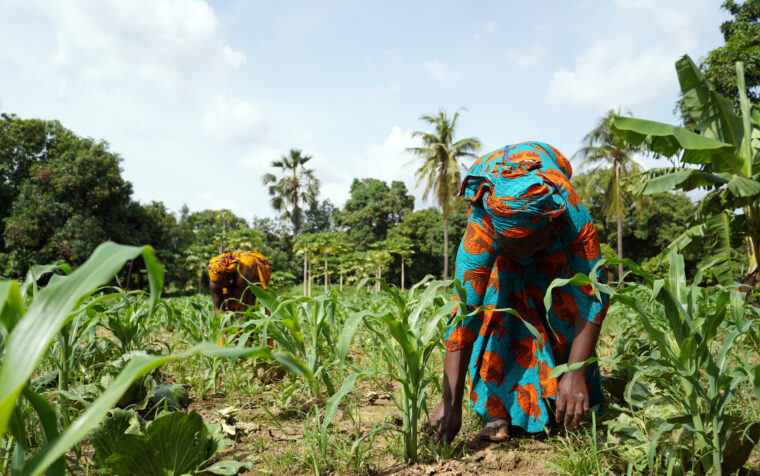
- News
- July 12, 2023
Expanding protection for smallholder farmers in Africa with One Acre Fund and Howden Broking
Global Parametrics is pleased to announce the expansion of our parametric protection scheme with One Acre Fund for smallholder farmers. We and One Acre Fund have partnered with international insurance group, Howden Broking, to expand the programme this year in Rwanda.
GP has been working with One Acre Fund since 2020 on a parametric solution for excess rain and drought risk, with payments intended to provide financial protection and resources to help farmers mitigate the impacts of extreme weather and improve livelihoods with climate smart investments through One Acre Fund loan protection.
Key highlights of the partnership include:
🔹 2020 One Acre Fund and GP began working in Tanzania on a parametric solution for excess rain and drought risk.
🔹 2022 scaled up to include Tanzania and Malawi, protecting 175,000 smallholder farmers.
🔹 2023 scaled up to include Rwanda, benefiting a further 800,000 people.
🔹 $650,000 expected payout this year following the ongoing East African drought and Cyclone Freddy.
The solution is backed by the Natural Disaster Fund, a public-private partnership managed by Global Parametrics with seed investment from the UK’s Foreign, Commonwealth and Development Office and Germany’s Federal Ministry for Economic Cooperation and Development (BMZ) via KfW, with global reinsurer Hannover Re providing matching capacity.
Read more here: https://www.reinsurancene.ws/global-parametrics-one-acre-fund-partner-with-howden-to-expand-parametric-scheme/

- News
- May 17, 2023
Global Parametrics Annual Impact Report 2022
At Global Parametrics, impact is at the heart of everything we do. It guides our mission and vision of a world which is thriving and resilient to extreme weather and natural hazards.
We are delighted to release our 2022 Annual Impact Report, showcasing the incredible progress made toward these ambitions. 2022 marked the sixth year of our continued efforts to close the global protection gap, and with thanks to collaborations with partners long-standing and new, we were able to multiply our impact.
Highlights include:
- 23+ million beneficiaries provided with risk protection;
- Protection across 55 low- and middle-income countries;
- Coverage for 6 perils, including: earthquake, flood, tropical cyclone, excess rain, drought and excess wind.
As the nature of climate and disaster risk faced by communities around the world continues to change and intensify, we are encouraged by the progress made in 2022 as a significant foundation to build far greater resilience for those who need it most in the year to come.
Please read our Global Annual Impact Report 2022 here to learn more about our work.
With special thanks to our Natural Disaster Fund partners, the German Government’s Federal Ministry for Economic Cooperation and Development (BMZ), KfW, UK Government’s Foreign, Commonwealth and Development Office, and Hannover Re.
- News
- February 9, 2023
Global Parametrics appoints Tim Ingram as new Board Chair

Global Parametrics is delighted to announce the appointment of Tim Ingram as its new Board Chair with effect from February 2023.
Most recently, Tim was Chair of the Board at each of QBE Insurance (UK) Limited, QBE European Operations plc and QBE Underwriting Limited.
After a long executive career in international banking and a decade in senior non-executive positions within the insurance sector, Tim brings a wealth of knowledge and experience that will be invaluable to Global Parametrics’ continued growth.
Tim succeeds in post Deborah Hazell, the current CEO of Unity Trust Bank, who has served as interim Board Chair of Global Parametrics since the beginning of 2022 and as a Non-Executive Director since 2019.
Deborah’s commitment to, and support for, Global Parametrics and its impact-focussed mission has played a key role in enabling the continued development and evolution of the company.
Angus Kirk, the acting CEO of Global Parametrics said: “We are extremely grateful to Deborah for all that she has contributed to Global Parametrics during the course of the past few years particularly during the past 12 months in her capacity as interim Chair. We have been very fortunate to have the benefit of her wisdom, counsel and expertise in helping to guide Global Parametrics during her time in office. In Tim, we are delighted to have found a successor of the highest calibre and expertise and are really looking forward to working with him to help take Global Parametrics to the next stage of its development”.
Commenting on the appointment, Tim Ingram said: “I am very excited to be joining Global Parametrics as its Board Chair at a very important time in its progress and very much look forward to building on the firm foundations laid by Deborah, the Global Parametrics team and the British and German Governments in creating a sustainable impact delivering financial institution”.
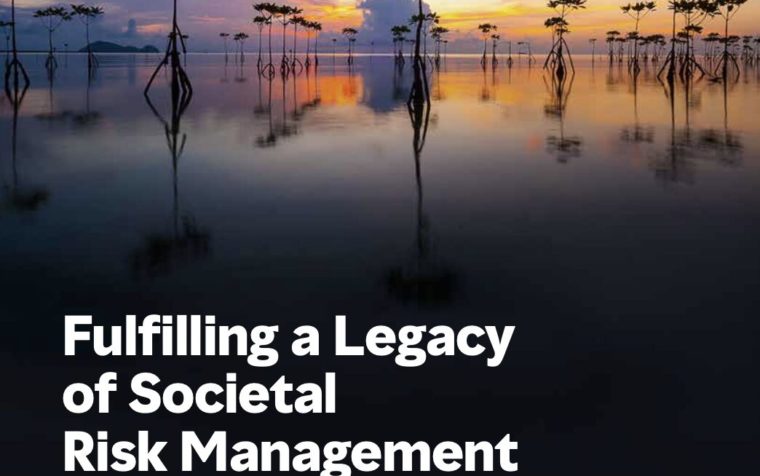
- News
- November 30, 2022
Global Parametrics featured: “Fulfilling a Legacy of Societal Risk Management”
Global Parametrics and its partners have been featured in “Fulfilling a Legacy of Societal Risk Management” published by The Climate Change High-Level Champions, Marsh McLennan, UN Race to Resilience, and Adrienne Arsht-Rockerfeller Foundation Resilience Centre. The report, published at COP27, highlights the advances in community-level climate risk reduction and adaptation through insurance sector innovations.
The report features ‘Pioneering Projects’ which reflect the spirit of urgency of climate change adaptation. Two of Global Parametrics’ innovative programs, B-READY and Climate Risk Insurance program, are showcased in this section. These programs demonstrate how parametric solutions, implemented through multi-sector partnerships, contribute to community-based anticipatory action and climate resiliency for those most vulnerable.
The B-READY program harnessed a forecast parametric index to trigger cash transfers to pre-identified vulnerable populations. Using these cash transfers, our partners Oxfam Novib, Oxfam Pilipinas, Plan International Philippines, Plan International provide preparedness training and resources in the days before a climate event in the Philippines, Sudan, and Indonesia. The B-READY program mitigates loss and damage and supports immediate post-event recovery.
The Climate Risk Insurance program, in partnership with the Mahila Housing Trust via capacity from our Natural Disaster Fund, combines a parametric index-based risk transfer solution with climate resilience training on adaptation measures. The program aims to protect female entrepreneurs in urban centres in India from the social, economic, and health risks that heatwaves and floods pose to their livelihoods.
To find out more, read the full report here: https://www.marshmclennan.com/content/dam/mmc-web/insights/publications/2022/november/Race%20to%20Reslience%20Report_COP27%20FINAL.pdf
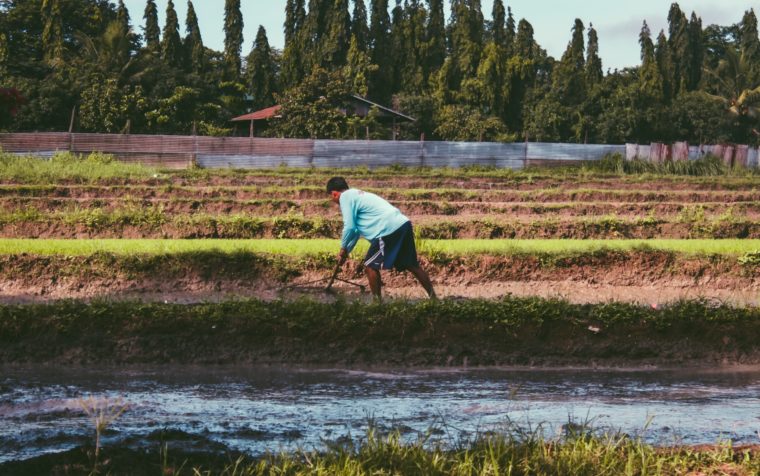
- News
- October 12, 2022
Scaling up protection for vulnerable farmers in the Philippines: reflecting on the CLIMBS Weather Protect Insurance programme
Read Global Parametrics’ Impact and ESG Manager, Wendy Smith, sharing her reflections on the success and opportunity promised by one of our most impactful and exciting programmes – the CLIMBS Weather Protect Insurance product.
In August, I visited the Philippines to meet with our in-country partner, CLIMBS Life and General Insurance Cooperative, to join them on two of their product roadshows in Davao City and Cebu City. It was a chance to share with CLIMBS’ customer cooperatives the value of our Weather Protect Insurance product and the ways it could benefit their farmer members and communities. Farmers in the Philippines have limited capacity to protect themselves against extreme weather events, due to precarious incomes from variable yields. Indeed, financial institutions can perceive the agricultural sector to be too risky, restricting farmers to access to credit. The CLIMBS Weather Protect Insurance programme provides is an effective alternative which protects the Philippines’ agricultural sector against the increased risk of climate change related events.
This year, the roadshows were a space to share evidence of the success of the Weather Protect Insurance product in its initial pilot. In 2021, the pilot, funded by our Technical Assistance Facility with capacity from the NDF partnership, provided protection against the increased risks posed by heavy rainfall events for 14 cooperatives across 15 provinces protecting 3,600 farmers. The product triggered three times in the year, following Typhoons Rai and Megi/Agaton, resulting in pay-outs for 8 of the 14 cooperatives, across six affected provinces.
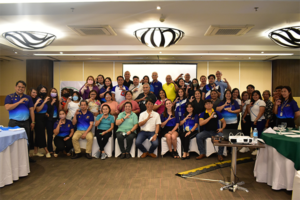
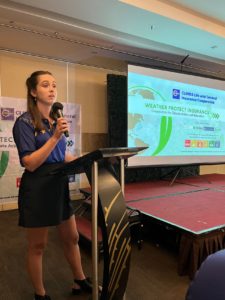
However, the 2021 pilot did more than demonstrate the success of the product. Following learning events, in collaboration with farmers and cooperative members, consortium partners, including GP, CLIMBS and IBISA Network and CIAT, identified how the product could be improved to provide the best protection. The 2022 product incorporates those upgrades and offers cooperatives across CLIMBS’ network with a purposefully developed mechanism for disaster risk financing. Primarily, a wind-speed index was added alongside excessive rainfall, to reflect the reality of disruption faced by farmers during these extreme weather events. It also includes an upgrade of the online policy monitoring platform system, developed by IBISA, to include mobile compatibility for greater accessibility, as well as ensuring the agro-advisory learning modules developed and provided by CIAT address farmers most pressing concerns for climate change adaptation.
Once I had left the Philippines, the reality of the risk facing people across the Philippines became even clearer as Tropical Cyclone Noru made landfall on 24th September. This tropical cyclone, documented as one of the fastest rapid intensifications ever recorded in the Pacific Basin, caused widespread devastation for communities and businesses. The Philippines is recognised as one of the most vulnerable countries to climate change in the world. Tropical cyclones are a key risk, with the country already experiencing up to 20 per year – a figure set to increase both in quantity and intensity due to the rapidly changing climate. This will present challenges for those whose livelihoods and assets are so closely tied to weather that is increasingly becoming more unpredictable and destructive.
The new, and improved, Weather Protect Insurance product has now been developed and scaled to cover 105 cooperatives, representing 100,000 farmers across 42 provinces. It is evidence of the demand and need for innovative disaster financing solutions in climate vulnerable countries, especially targeting those communities and sectors that represent low-income groups where the need to build resilience for sustainable development is paramount.
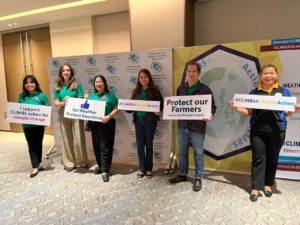
By Wendy Smith